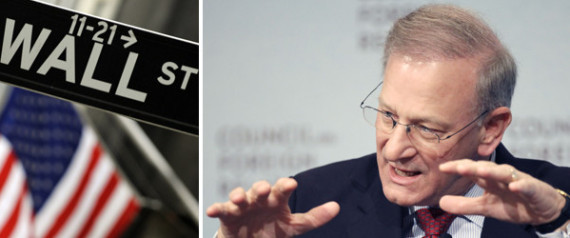 WASHINGTON -- Reforms instituted after the financial crisis to prevent future taxpayer-funded bailouts are bound to fail and will likely be weakened within the next few years, the Federal Reserve's longest-serving policy maker predicted Monday.
WASHINGTON -- Reforms instituted after the financial crisis to prevent future taxpayer-funded bailouts are bound to fail and will likely be weakened within the next few years, the Federal Reserve's longest-serving policy maker predicted Monday.The stark warning, offered by Federal Reserve Bank of Kansas City President Thomas Hoenig, who's been warning about the rise of too-big-to-fail banks for more than a decade, comes as international regulators finalize plans to increase supervision of and toughen requirements on the world's largest banking organizations as a reaction to the global financial crisis. Rather than break up big banks, politicians decided to simply subject them to more oversight.
Yet debate rages as to whether the requirements are too tough, or not tough at all, and whether regulators will have the backbone to follow through on their commitments. Republicans in the U.S. House of Representatives are trying to dismantle the domestic financial reform law passed last year; banks are screaming that lending will dry up, inhibiting the anemic U.S. recovery; and on the global level, regulators from some countries where large banks dominate the national economy (and thus enjoy overt taxpayer backing) are trying to weaken international accords.
For Hoenig though, the choice is clear when it comes to what to do with the financial institutions that caused the most punishing downturn since the Great Depression: break them up into pieces that regulators can understand and provide a backstop to entities engaged in the so-called real economy -- but allow those dabbling in more risk-laden activities to fail.
The Obama administration and Congress chose the alternate route in passing the Dodd-Frank financial regulation law. To Hoenig, they made a mistake.
"Following this financial crisis, Congress and the administration turned to the work of repair and reform," he said during a Monday speech in Washington. "Once again, the American public got the standard remedies -- more and increasingly complex regulation and supervision."
"The Dodd-Frank reforms have all been introduced before, but financial markets skirted them," he continued. "Supervisory authority existed, but it was used lightly because of political pressure and the misperceptions that free markets, with generous public support, could self-regulate."
Regulators will lack the will to wind down failing companies deemed systemically important financial institutions, or SIFIs, Hoenig said. The power to force large firms into liquidation was the centerpiece of the Obama administration's plan to reform the financial system in the wake of the crisis and Great Recession.
Full Article
Source: Huffington
No comments:
Post a Comment